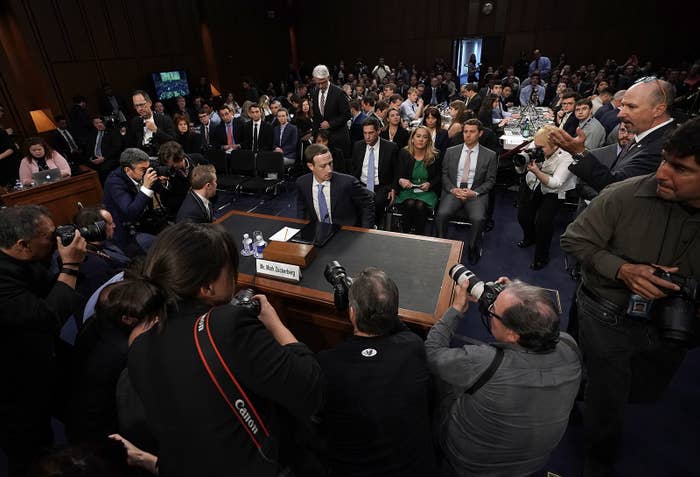
In his appearances before Congress this week, Mark Zuckerberg took personal responsibility for various Facebook failures: failing to respond sufficiently to threats from fake news, foreign interference in elections, hate speech, and privacy violations by bad online actors. He admitted his mistakes, outlined the steps that the company is already taking to fix them, and apologized.
If only politicians would do the same.
One of the most curious features of the present debate about Facebook — and one of the most infuriating for many of us who work in Silicon Valley — is how the company has become the primary source of blame for a common set of ailments facing society.
None of these problems were created by Facebook – and each of them should call into focus a lack of leadership on the part of many of the policymakers who lined up to admonish Facebook’s CEO.
Facebook, where I worked closely with the company’s leadership for several years, is regularly blamed for "fake news." But a torrent of fake and biased news from ostensibly legitimate news organizations flooded the US and Europe long before Facebook achieved its present scale. How many millions of people have imbibed a stream of outlandish conspiracy theories, casual prejudices, and outright distortions over the years from Fox News, cable TV, or talk radio?
Pew research shows that TV remains by far the dominant medium through which Americans consume their news. If social media should get flak for the potential impact of fake news on swinging an election, then why not the traditional media? And why not the countless politicians who have built their careers on exploiting divisions in our society by using or contributing to the spread of misinformation?
Facebook has also been attacked for enabling Russia’s online meddling. But Facebook is only a single front in the massive geopolitical showdown that is the new Cold War. While Russia has targeted Facebook, it has also conducted devastating cyberattacks around the world, and worked to infiltrate critical US infrastructure including power plants. Facebook is a victim of Russian cyberaggression, but many other important institutions have shown their vulnerability too. When a rogue superpower goes to work, even a company as clever and well-resourced as Facebook is going to struggle.
The fact that we are in another Cold War, and that our present cadre of strategic and political leaders seems incapable of containing Russia’s campaign of aggression, should at least make them blush when blasting Facebook over Russian interference.
And when it comes to bad online actors, such as developers who misuse data, that’s hardly a Facebook invention — and something the company has worked hard to counter. Over the years, internet giants including Facebook have invested billions of dollars in seeking to secure their platforms, to the point where investors have been spooked at the prospect of those investments significantly hurting profitability.
Facebook still has a lot of work to do to strengthen protection of user data, kick bad developers off the platform, and help people to better control their privacy. Strengthening trust in the way the platform manages users’ data and handles online advertising is equally important. To many people, ad targeting systems feel intrusive and opaque, and Facebook needs to do more to educate and explain how these systems work. But the platform will never be perfect, and like every human institution, it reflects the messy, chaotic society in which we all live. There are bad actors on Facebook, because there are bad actors everywhere. Expecting a perfect online platform is as deluded as expecting a perfect society.
It would help if politicians were generally well-informed about technology and the scale of online challenges. Strong regulatory oversight and support is an important part of helping the tech industry and innovators to manage these challenges. But in yesterday’s hearing, at times it seemed as if some senators needed a basic crash course from Mark Zuckerberg on how the internet works. That’s not just embarrassing for them; it calls into question their ability to effectively lead on these issues.
And ultimately, it's essential to get policymakers to recognize their own responsibility in solving these challenges.
Just as Facebook didn’t invent fake news, Russian cyberwarfare, or bad online actors, so too is it incapable of solving these challenges on its own. Facebook cannot erase the toxic climate of social and political polarization that creates the environment in which fake news finds receptive minds. Facebook cannot defeat Russian aggression alone, as much as the company is working to win the online arms race on its platform.
Politicians may get a kick out of kicking Facebook for its various mistakes, but perhaps they should look in the mirror and consider their own shortcomings. Facebook didn’t start the fire, and can’t put it out on its own — and we need government and the tech industry to work together to secure our digital future.
Dex Torricke-Barton is a corporate communications adviser. He has served as speechwriter for Facebook CEO Mark Zuckerberg, Google executive chair Eric Schmidt, and the United Nations, and as head of communications for SpaceX.
